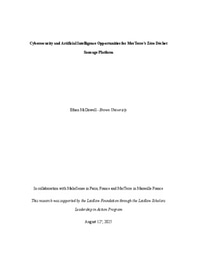Week 4: Shore to Strategy
Week 4: Shore to Strategy
Week four of my Central LiA Project with MakeSense and MerTerre was all about testing our ideas and grounding them in reality. With Jade in Marseille for part of the week, we had an energizing mix of coaching sessions, fieldwork, and one-on-one meetings that pushed our project forward in meaningful ways. The schedule was full, but it never felt rushed. Instead, each activity builds on the last, helping us refine both our deliverables and our understanding of the larger context we are working in.
What went well?
The week started strong with a meeting with Teo on Monday morning, where we reviewed my progress on the data and legislative components of the deliverables. Later that day, I joined a group coaching session with Jade and the MerTerre team at La Bascule, followed by additional coaching from Emma. Having both Jade and Emma’s perspectives in the same day created a kind of strategic double vision, Emma pushed us to think big-picture, while Jade kept our eyes on practical implementation.
Wednesday’s field study at Le Frioul with Teo was a highlight. Spending the morning on the island gave me a direct view of the environmental challenges we are trying to address. Observing the waste patterns along the coastline and talking through on-the-ground realities with Teo helped me connect the dots between our data analysis and the lived conditions in the field. It also sparked ideas for how our deliverables could better reflect site-specific realities.
What could have been done differently?
I could have better prepared for the field study by bringing more structured observation templates. While I took notes, I realized afterward that a consistent recording method would make it easier to integrate these observations into the data systems we are developing. Next time, I want to have a clear checklist or form that captures environmental conditions, types of waste, and potential intervention points.
What did I learn about myself when working with others?
This week reinforced how much I value learning from team members with different expertise. Watching Jade facilitate the coaching session reminded me that collaboration is about more than sharing information, it is about creating space for everyone’s strengths to surface. I found myself stepping into a bridging role, connecting my technical work with the team’s ecological and policy-focused insights.
What did I learn about leadership?
Jade’s leadership style is a great example of guiding without overshadowing. During the coaching sessions, she let the team generate ideas organically, but she knew when to step in and redirect the conversation to ensure we stayed on track. In contrast, Teo’s leadership during the field study was hands-on and highly contextual, pointing out subtle environmental details that might otherwise have been missed. Both approaches showed me the value of adjusting leadership style to the setting and objectives at hand.
What do I want to develop or focus on next?
Looking ahead, I want to focus on translating field observations into actionable insights within our deliverables. That means finding ways to connect site-specific patterns of waste with broader datasets and legislative recommendations. I also want to refine my facilitation skills so I can contribute more actively during group strategy sessions, ensuring that the technical aspects of our work are clearly understood by the entire team.
Updates on Deliverables
I began exploring how to integrate field study observations into the existing Zéro Déchet Sauvage data pipeline. My aim is to make location-specific waste data more searchable and easier to visualize, so that patterns from places like Le Frioul can inform decision-making at both local and regional levels. This includes mapping potential API connections for automated updates and considering lightweight tools for real-time field input.
I focused on a comparative analysis of France’s existing legislation alongside the EU policy framework on diffuse abandoned waste. I am identifying where current measures are strong and where there are opportunities for reinforcement. To give MerTerre and France concrete reference points, I am drawing from Japan’s highly coordinated waste management system and Canada’s combination of national and provincial regulations as examples of scalable, enforceable models. I also began examining relevant international treaties, such as the outcomes from the recent United Nations Ocean Conference in Nice and the ongoing negotiations on the global plastics treaty in Geneva. By linking these frameworks with our data findings, I am building a foundation for legislative recommendations that are both practical and globally informed.
Life in Marseille this week
Marseille felt especially alive this week. The early start for Wednesday’s field study meant seeing the city before it was fully awake, with the port bathed in soft morning light. The boat ride to Le Frioul offered a shifting view of the city skyline, framed by the sea and distant hills. Back on the mainland, I took some time to walk along the Corniche in the evening, watching locals gather along the seawall to fish or simply enjoy the breeze.
In quieter moments, I found myself appreciating La Bascule’s neighborhood; the familiar café owners, the street art tucked into unexpected corners, and the rhythm of a city that somehow feels both fast-paced and unhurried. Being here makes it easy to remember that our work is not just about data or policy; it is about protecting the daily life and beauty of places like this.



Please sign in
If you are a registered user on Laidlaw Scholars Network, please sign in